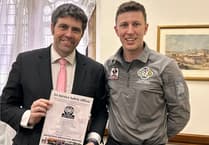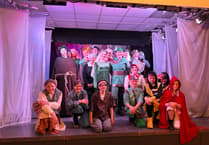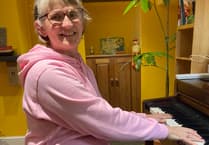The call sign “5PY” probably won’t mean much to anyone these days, but it played an important part in South West history and its legacy lives on to this day in the form of something everyone is familiar with: the BBC.
One hundred years ago, on March 28, 1924, the British Broadcasting Company as it was known back then, came to Plymouth. A studio was set up in Athenaeum Lane in the city centre.
On that evening the new station was launched and listeners all over the country were welcomed to Plymouth by the Lord Mayor.
Last week, on the one-hundredth anniversary, I joined other former members of staff to mark the occasion and to reflect on the pioneers of a century ago.
During the celebrations last week we were treated to two archive films that included interviews with some of the original members of staff.
One of the first members of staff was a secretary called Jean Tye. Back in 1974 on the 50th anniversary she recalled how at her job interview she was not only asked about her typing skills but also whether she could sing and play a musical instrument.
Members of that early team at 5PY were required to work in front of the microphone as well as their duties behind the scenes.
I am very glad singing and playing an instrument were no longer required skills when I was interviewed for a job at BBC South West in 1997!
But I would like to think that Jean and her colleagues would recognise that spirit of everyone pitching in still survives today; it’s now known as “multi-skilling”.
I would also like to think that the 1924 team would recognise the family feel that they gave to the output has been passed on through generations of broadcasters in Plymouth.
That warmth and close bond between the presenters and the audience has endured throughout the one hundred years since the BBC came to Plymouth.
When television started in Plymouth in the 1960s that connection grew even stronger. The faces of the news quickly became household names and much loved personalities.
Sheila Tracy, Peter Crampton and Tom Salmon, who you may remember had a rich Cornish accent, quickly established themselves as trusted members of viewers’ families.
Hugh Scully, Angela Rippon, Sue Lawley, Fern Britton and Jill Dando followed those early television presenters. BBC South West has a long tradition of developing talent that would go on to achieve national success.
But from those early days right through to the Spotlight we know today, there has always been a great importance placed on creating a warm and welcoming feel to the programmes.
I learnt a lot from watching many of my predecessors. Hugh Scully was able to effortlessly switch from serious news to light-hearted topics, not always an easy trick to pull off.
Presenter Russell Labey, who I eventually took over from, was also a master at taking the viewer from hard news to the softer side of life.
He was famous for his very quick wit; something that often got him into trouble with the bosses.
One of Russell’s off the cuff remarks even prompted a manager to issue an order to all presenters that ad-libs will be scripted from now on. We soon ignored that!
During my time there we frequently bent the rules. For example when Spotlight finished just before 7pm we would be required to re-join the network in London for a series of trails for programmes that were coming up.
But, if we had one more story we wanted to squeeze in, our producers in Plymouth would often ask the person who was keeping an eye on all the timings to work out how long the London trails slot was. We would then steal that time and re-join the network just in time for the next programme.
On one occasion my editor even got me to deliver a news flash in the middle of the morning when we had no scheduled bulletin. I appeared in the South West at the end of the 11am national news summary when viewers should have been seeing the national weather forecast!
We also had a lot of fun. I can remember when a Plymouth Crown Court judge asked if he could come and watch Spotlight being broadcast.
He sat in the control gallery as we presented the programme. Weatherman Craig Rich and I hatched a plan to subtly include as many legal references as we could into the programme.
Consequently I handed over to Craig with the words: “The weather’s been criminal for farmers.” To which Craig replied: “And the jury’s still out on when it will improve”.
Craig went on to use numerous legal phrases in his forecast; the judge never noticed!
One hundred years on from the BBC’s first broadcast from Plymouth the media landscape is very different.
But just for the moment I will be thinking of all those pioneering people, on air and behind the scenes, who’ve given us a hundred years of the BBC in the South West.
Bye for now.




